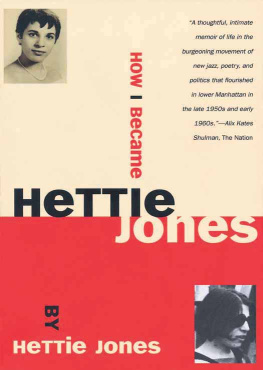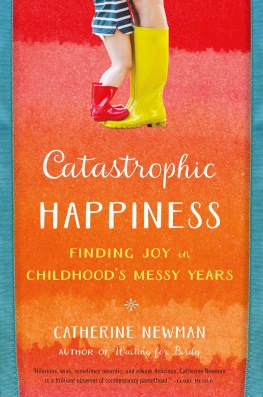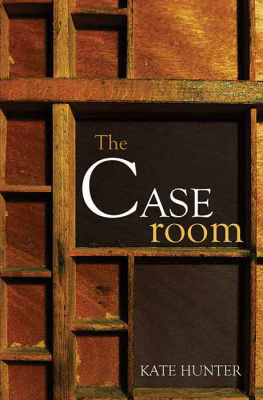
Heartstoppinga piercing, bittersweet picture of what it was really like in the hot center of the literary, jazz and art world that was downtown Bohemian New York as the fifties became the sixties.
Sara Blackburn
A feminist scrutiny such as this is just what those last decades needed, as the beats themselves needed it.
Lawrence Ferlinghetti
This is a great read, moving, joyous, painful. It's the story of a daughter, lover and mother set in the Village. Hettie lives on the edge, in the heart of the new jazz, poetry, politics and life. At last a book about the fifties and sixties from a feminist that covers sex, race, and class and the ups and downs of daily existence.
Rosalyn Baxandall, author of Words on Fire
Hettie Jones has written a rare and valuable book, a personal story that works equally as history. Her memoir is the memoir of an important artistic and political milieu; it's possibly the best account yet written of what it was like to be at the center of New York Bohemianism in the 1950s and 1960s. Her honesty and forgiveness and the clarity of her writing are exemplary and moving.
Russell Banks
Rooted in a time when issues of race and religion (but not yet gender) were forcing their way into public consciousness, Jones' story draws its strength from a woman's search for her poetic voice amid the tidal waves of change.
Cindy Hirschfeld, Trenton Times
She certainly has told it like it was! The book serves to remind us of how many strong currents there were that sweep into our lives today; how much vitality there was in our lives in our chaotic youth; and how many issues were set in relief and struggled with and are still with us.
Dore Ashton, author of The New York School: A Cultural Reckoning
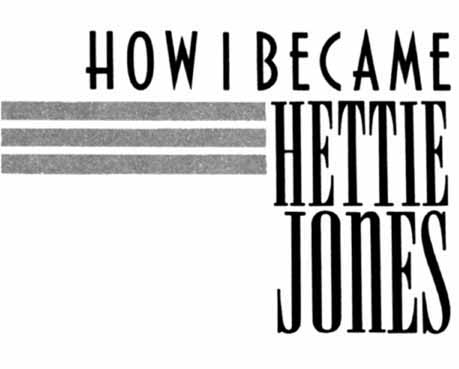
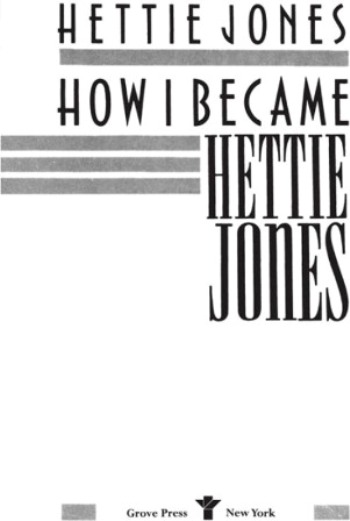
Copyright 1990 by Hettie Jones
All rights reserved. No part of this book may be reproduced in any form or by any electronic or mechanical means, or the facilitation thereof, including information storage and retrieval systems, without permission in writing from the publisher, except by a reviewer, who may quote brief passages in a review. Any members of educational institutions wishing to photocopy part or all of the work for classroom use, or publishers who would like to obtain permission to include the work in an anthology, should send their inquiries to Grove/Atlantic, Inc., 841 Broadway, New York, NY 10003.
Originally published in 1990 by E. P. Dutton,
a division of Penguin Books USA Inc.
Published simultaneously in Canada
Printed in the United States of America
Library of Congress Cataloging-in-Publication Data
Jones, Hettie
How I became Hettie Jones / Hettie Jones.
p. cm.
ISBN-13: 9780802196781
1. Jones, HettieBiography. 2. Baraka, Imamu Amiri, 1934Marriage. 3. Women authors, American20th centuryBiography. 4. Authors' spousesUnited StatesBiography.
I. Title.
PS3560.O485Z47 1997
818.5409dc20
[B]
96-32006
Design by Margo D. Barooshian
Grove Press
an imprint of Grove/Atlantic, Inc.
841 Broadway
New York, NY 10003
Distributed by Publishers Group West
www.groveatlantic.com
06 07 08 09 10 10 9 8 7 6 5 4
The author is grateful for permission to quote from the following:
Further Notice from On Bear's Head, by Philip Whalen. Copyright1960, 1965, 1969 by Philip Whalen. Reprinted by permission of the author.
The Thing Made Real and The Stillness of the Poem from Meat Air, by Ron Loewinsohn. Copyright1970 by Ron Loewinsohn. Reprinted by permission of the author.
Unpublished letter of July 6, 1960, from Kenneth Koch to Hettie Jones. Reprinted by permission of Kenneth Koch.
Animal Vegetable Mineral from Savonarola's Tune, by Max Finstein. Published by Laurence Hellenberg, 1959. Reprinted by permission of the publisher.
The Kingfishers from The Collected Poems of Charles Olson, by Charles Olson. Copyright1987 by the Estate of Charles Olson. Reprinted by permission of the University of California Press.
A Counterpoint from The Collected Poems 19451975, by Robert Creeley. Copyright1983 by the Regents of the University of California. Reprinted by permission of the University of California Press.
Mourning Letter, March 29, 1963 from The Collected Poems, 19561974, by Edward Dorn. Copyright1975 by Edward Dorn. Reprinted by permission of the Four Seasons Foundation.
The Chamber from Hymns to St. Geryon and Dark Brown, by Michael McClure. Copyright1980 by Michael McClure. Reprinted by permission of the Grey Fox Press.
Fine and Mellow by Billie Holiday. Copyright 1940 by Edward B. Marks Music Company. Copyright renewed. Used by permission. All rights reserved.
A Fixture from The Darkness Surrounds Us, by Gilbert Sorrentino. Published by Jonathan Williams Publisher. Copyright1960 by Gilbert Sorrentino. Reprinted by permission of the author.
From The Sanskrit Preface To A Twenty Volume Suicide Note, The Clearing The Death of Nick Charles, For Hettie, Hymn for Lanie Poo Notes For A Speech, and In Memory of Radio from Preface To A Twenty Volume Suicide Note, by LeRoi Jones. Copyright1961 by LeRoi Jones. Reprinted by permission of Corinth Books.
for my daughters, Kellie and Lisa
pat my bro
pat my sister
see we tender
women
live
on
I owe this book to Berenice Hoffman, first, for her faith, to Joyce Johnson for her example, Helene Dorn for saving my letters, Dorothy White for standing by, and to Joyce Engelson, my editor, who waited fifteen years for me to write it.
Conversations with Steve Cannon, Fielding Dawson, and Basil and Martha King were helpful; the assistance of Margaret Wolf invaluable; the support of Cora Coleman, Coyt L. Jones, and the late Anna Lois Jones immeasurable. Thanks to everyone who calls me Mom, and to all the many missing names: if you were there then please come in.


M eet Hettie Cohen. I'm sitting at an ancient rolltop desk that's stuffed to its top compartments with manuscripts and envelopes and all the related litter of magazine production, and I have no idea that this will be with me for years after I've become Hettie Jones.
Nearby, running half the length of a cluttered storefront office, is a six-foot-high row of wooden milk crates, housing old 78 rpm jazz records in crumbling paper sleeves. Flakes of this yellow-brown stuff drift down and settle like snow on the dirty linoleum, and the smell of it masks the casual funk from a darker back room, where Richard (Dick) Hadlock, editor of the Record Changer, the magazine published here, sleeps whenever he's not with his girlfriend.
But he's with her nowor somewhereleaving me: Hettie Cohen, a small, dark, twenty-two-year-old Jew from Laurelton, Queens, with a paperback book in my hand. Kafka's
Next page
